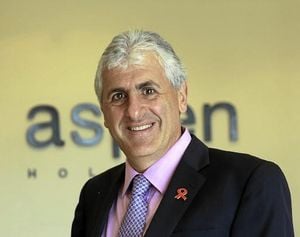In a notable legal maneuver that has drawn significant attention, convicted felon Markeith Loyd has appealed his death sentence to the United States Supreme Court, sparking a renewed debate over capital punishment in Florida. Loyd, whose case involves the tragic slaying of Orlando Police Lieutenant Debra Clayton in 2017, argues that the prosecution misled jurors regarding their responsibilities during the sentencing phase. His appeal highlights ongoing concerns about fairness and transparency in the judicial process, particularly in cases that carry the ultimate penalty.
Markeith Loyd's legal saga began when he was accused of killing Lt. Clayton, who was trying to apprehend him in a Walmart while he was already a suspect in another murder case, that of his pregnant girlfriend, Sade Dixon. The events surrounding these violent crimes have captured public interest, revealing deeper questions about law enforcement's role and the judicial system's handling of such cases. Loyd was sentenced to death in 2022, and a significant part of that verdict hinged on jury deliberations, which are under scrutiny once again.
In his petition filed with the Supreme Court, Loyd's attorney, Nancy Ryan, argued that prosecutor conduct during the trial misled jurors about the necessity of their unanimity when deciding his sentence. Specifically, the argument claimed that the prosecutor suggested jurors should strive for consensus, which Ryan contends diminishes their personal accountability for a decision as consequential as a death sentence. This line of reasoning appeals to current legal standards that prohibit arguments misleading jurors about their roles, as established by precedents in federal court, raising doubts about the integrity of the initial verdict.
When Loyd's case reached the Florida Supreme Court, it upheld his conviction, dismissing the claims that the trial was tainted by prosecutorial misconduct. This ruling does not only reinforce his existing sentence but also emphasizes the intense scrutiny under which capital cases are placed, reflecting on the broader national debates surrounding the death penalty.
Florida law around the death penalty itself has evolved markedly over the years. In 2017, the state enacted a law requiring unanimous jury recommendations before a death sentence could be imposed. However, in a surprising legislative shift in 2023, Florida lawmakers eliminated this requirement. This change has fueled criticism from various quarters, including legal analysts and advocacy groups who argue that the updated standards undermine due process and could perpetuate wrongful convictions.
The trajectory of Markeith Loyd's appeal reveals significant intersections between legal policies, human rights advocacy, and societal expectations around criminal justice. The Attorney General's office, representing the state in this case, has sought extensions to prepare a response to Loyd's Supreme Court appeal, indicating the complex nature of capital cases and the uncertainties they introduce into the legal system.
As details of the case continue to unfold, public interest in Loyd's appeal reflects broader concerns about accountability within the judicial system. Advocates for death penalty reforms argue that cases like Loyd's highlight the need for comprehensive reviews of how capital punishment is applied, particularly as factors such as socioeconomic status, race, and geography often play disproportionate roles in sentencing outcomes.
In addition to the ethical debates surrounding Loyd's appeal, his case also raises questions about law enforcement practices and the danger officers face in their line of duty. Lt. Clayton’s murder sent shockwaves throughout the Orlando community, eliciting an outpouring of grief and prompting discussions about officer safety and community relations with law enforcement agencies. Many residents still remember the intense media coverage and community rallies calling for justice for Clayton.
The emotional aftermath of Clayton's death remains palpable, illustrated by public statements from her family members and local leaders who insist on justice not only for Clayton but also for the broader community that she valiantly served. They have voiced concerns over the nature of Loyd's appeals and have called for closure, expressing a desire to ensure that justice is not only served but seen to be served.
As the clock ticks on Loyd's appeal, it has become clear that this case will continue to evolve and shape discussions around criminal justice in Florida. The balance of justice, the role of juries, and the ethical implications of capital punishment in the state remain at front and center of public discourse, inviting varied perspectives from advocates, policymakers, and ordinary citizens alike. The implications of this case extend beyond Loyd himself; they resonate within a system striving to balance justice with fairness, scrutiny with compassion, and law with ethics.
The outcome of Loyd's appeal could potentially set significant precedents for future capital cases in Florida and beyond. It highlights the intrinsic complexities that justice demands and forces society to reckon with choices that could alter lives irrevocably. As the Supreme Court prepares to address this matter, many are left wondering: will Loyd's claims lead to a reconsideration of jury standards and the prosecution's role, or will they reinforce existing conventions that govern the pursuit of justice in death penalty cases?



